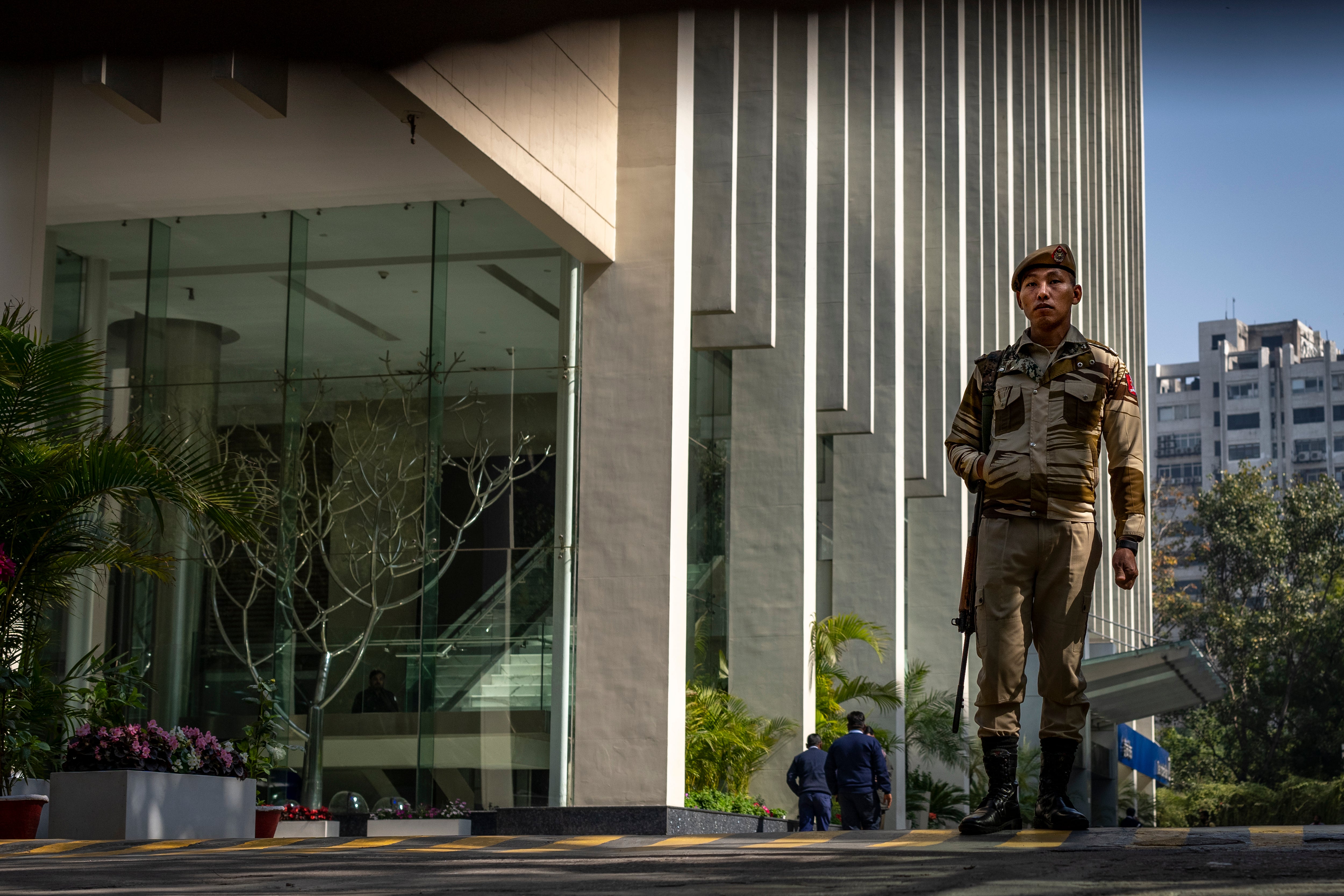India’s tax raids are an assault on the country’s free press
Media watchdogs and rights groups have been drawing attention to the decrease in media freedom in India for years, writes Stuti Mishra


The “survey” at the BBC offices by Indian tax authorities earlier this week may have been the first targeting of a foreign media organisation, but for many journalists working in India, including myself, it was just another unsettling reminder of the shrinking space for media in the country.
For three days, BBC employees in Delhi and Mumbai were subjected to questioning by income tax authorities, with multiple reports stating that their phones had been seized as tax officials went through the corporation’s financial records.
The authorities say they have uncovered irregularities in the BBC’s accounts, with the matter now subject to further investigation as the BBC said it would “continue to cooperate”.
These raids occurred just weeks after the BBC released a documentary critically examining Indian prime minister Narendra Modi’s leadership during the 2002 religious riots in Gujarat, where he was serving as chief minister at the time. The riots resulted in the deaths of more than 1,000 people, mostly Muslims.
While supporters of Modi may argue that there is no connection between the tax raids and the documentary, observers of Indian politics in recent years are more likely to recognise a pattern in these events.
The raids were much too similar to those many Indian journalists have witnessed in their careers. In my six-year-long career so far, two of the three organisations I have worked with have been raided by tax officials – one while I was at work.
Much like at the BBC, tax officials suddenly entered the premises of The Quint early one morning in October 2018. At the time I was an early-career journalist, not associated with any of the managerial activities the officials were looking into.
From what I remember now, four years on, I continued to do my job just like everyone else. My phone wasn’t taken, and there was no contact with the officials. But their presence inside the premises was enough to create a sense of tension. I could see editors and senior employees going in and out as they interacted with the officials in the conference room.
The Quint’s founder, Raghav Bahl, issued a statement that day saying that “dozens of IT officials” had “descended” on his private residence, as well, at around the same time. He said he had urged officials not to look at “any other mail/document which is likely to contain very serious/sensitive journalistic material”.
The same day, another organisation in southern India, The News Minute, was “surveyed” by tax officials.
Both organisations are known for their on-the-ground reporting, and for looking into the various human rights violations and hate crimes, often targeting minorities, that have been reported in the last few years of Mr Modi’s rule.
Most of the organisations that have come under the radar of Indian agencies have been critical of the government in their reporting. While very little is revealed about these cases to the media, and even to employees, such raids are enough to remind journalists of the risks they and their employers face under this government.
“Indian authorities have used tax investigations as a pretext to target critical news outlets before, and must cease harassing BBC employees immediately, in line with the values of freedom that should be espoused in the world’s largest democracy,” Beh Lih Yi, from the Committee to Protect Journalists, said in a statement after the raids on the BBC.
Similar statements come out after every raid. However, the cases continue, one after another, and media organisations continue to crumble in the face of rising legal challenges.
For me personally, as a young reporter, it was my first up-close encounter with the massive power the authorities hold over the media, and a reminder that if your employer isn’t safe from harassment, then you probably aren’t either.
Trolling and harassment are something most Indian journalists have become used to, and in my experience, this is an everyday affair. Any criticism of the government is set to be met with unfounded allegations, and often with targeted online attacks and abuse. Many journalists have been jailed and attacked in recent years.
A report released in May 2022 by the World Press Freedom Index showed that India’s ranking had dropped to 150th from the previous year’s 142nd place among 180 nations. Media watchdogs and rights groups have been drawing attention to the decrease in media freedom in India for years, and have repeatedly expressed concerns about rising polarisation in the country.
“The violence against journalists, the politically partisan media, and the concentration of media ownership all demonstrate that press freedom is in crisis in the world’s largest democracy, ruled since 2014 by prime minister Narendra Modi, the leader of the Bharatiya Janata Party (BJP) and the embodiment of the Hindu nationalist right,” the report said.
It’s not a hidden truth that the rising polarisation in the country is in part fuelled by the way in which Indian news channels work as propaganda machines for the government. Indian primetime TV debates target minorities and paint the critics of the Indian government as “enemies”.
This change in the media landscape in India did not happen overnight. Over the years, harassment in various forms has delivered a clear message to journalists: either toe the line, or face consequences.






Join our commenting forum
Join thought-provoking conversations, follow other Independent readers and see their replies
Comments